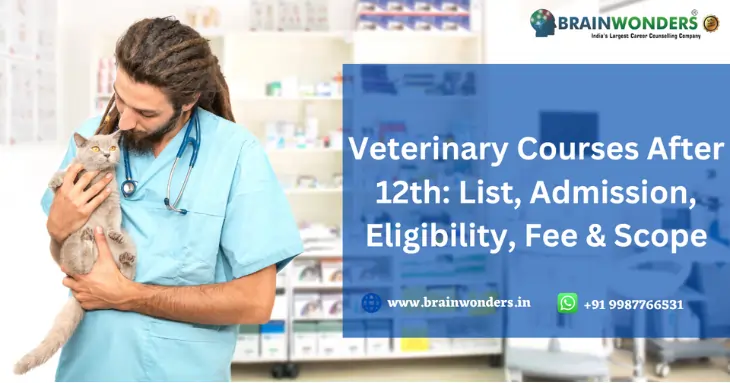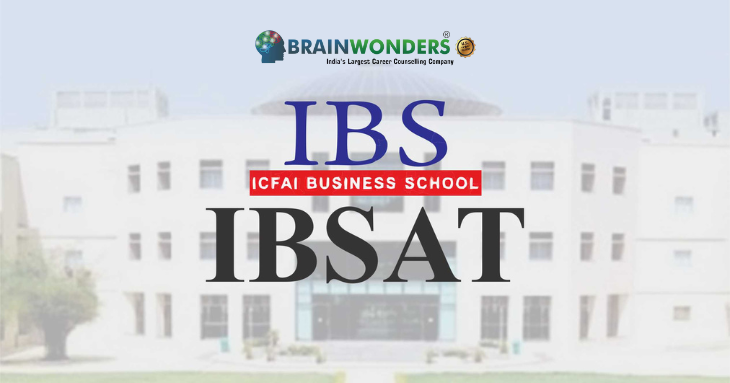

Take Brainwonders Career Test and make the right decisions for your college and course ahead
Let your unique personality, strengths, and traits guide to make the best decdision of your life!
Blog
05 January,2024 | By Brainwonders

Veterinary studies involve examining and treating animals to save their lives. This field focuses on assessing the health of animals, identifying diseases, and providing appropriate medical care. It includes administering injections, performing surgeries, and prescribing medications. Additionally, animals are given proper care, relaxation, and a nutritious diet to ensure their well-being.
Students who choose veterinary courses after 12th, will learn about animal breeds, diseases, and innovative treatment methods. Veterinary clinics are established to protect animals from infections and provide necessary guidance to the owners.
Students After 12th can pursue a Bachelor of Veterinary Science or a Diploma in Veterinary Science. These course offer a combination of theoretical and practical training. It is recommended that students thoroughly read the article and take note of course content, fees, and eligibility criteria.
How many years are veterinary courses after 12th? Veterinary courses are available at undergraduate (UG), postgraduate (PG), diploma, and certificate levels. The duration of each level varies. UG courses typically span 3 years, while PG courses can be completed in 2 years. Diploma and certificate courses have a duration of 6 months to 2 years.
This article provides detailed information about veterinary courses after the 12th grade, including course details, fees, eligibility criteria, scope, and job opportunities. It is advisable to read the entire article to obtain accurate information.
Get the Best Counselling Support in India With a Click
| Course Name | Veterinary Courses |
| Duration | 3 to 5 Years |
| Admission Process | Online |
| Eligibility | 12th Pass with 45% marks |
| Offered By | IMTS Institute |
| Approved By | UGC / DEB |
| Fee Structure | INR 32,000 – INR 82,500 |
| Type | Distance Learning |
If any student desires to have an interaction session or has any queries, they can reach out to us through the WhatsApp chat available on the official website of Brainwonders. Upon contacting us, students will receive assistance from an expert and experienced educational counselor.
Veterinary medicine is a medical field that focuses on preventing, controlling, diagnosing, and treating diseases, conditions, and injuries caused by zoonotic organisms. It encompasses various topics such as cattle farming, breeding, nutrition research, and product development related to livestock. Veterinarians are concerned with the health of both domesticated and wild animals, as diseases can affect animals from various species.
The provision of veterinary care is widespread in professional and informal settings. While specialized care is typically provided by veterinarians, veterinary technicians, and nurses may also provide certain types of care. A veterinary physician is commonly known as a veterinarian or veterinary surgeon.
Choosing to study veterinary courses after high school can open up a bunch of opportunities. Here are some reasons why this path might appeal to students:
Love for Animals: If you genuinely care for animals, these courses let you work directly with them, helping to keep them healthy and happy.
Diverse Career Opportunities: Students will get various career opportunities in the feild such as Veterinary Microbiology, Veterinary patholoy, Veterinary radiology and many more.
Job stability: An individual will can get jobs in private or goverment sectors. This is a growing feild as most of the people are fond to pet animals especially dog and taking care of this animals whenever required will make them visit to the veterinary doctor.
Increasing Application in the Animal Sector: As the pet industry, livestock management, and animal research have been on the rise, the demand for professional veterinarians in different fields such as zoos, animal shelters, pharmaceutical firms, and others has been increasing.
Satisfaction and Satisfaction: Taking care of animals and assisting them to recover or to get better will be a great satisfaction and reward for many. Veterinary practitioners always feel accomplished as a result of their practice.
World Opportunities: Veterinary certification is global, making practitioners travel worldwide or have various working stations, with better freedom to make choices on which opportunities to seek.
Influence on Animal Conservation: Veterinary education can also set you up for employment in wildlife conservation and environmental protection to work towards the conservation of endangered species and ecosystems.
To qualify based on merit, you usually need at least 50% marks, while SC/ST students need 45%.
Some places also require you to take entrance exams, like NEET or the UP Veterinary Entrance Exam.
You'll need to have finished 12th grade from a recognized board.
It's also important to have at least 45% in your previous degree.
There isn’t an age limit for admissions.
Regarding fees, veterinary courses in India typically cost between INR 32,000 and INR 82,500.
| Courses | Eligibility | Fee (Per Year) |
| BVSc | 45% marks in 10+2 Science Stream (PCB) | Rs 42,999 |
| BVSc & AH | 45% marks in 10+2 Science Stream (PCB) | Rs 47,999 |
| BVSc in Veterinary Pathology | 45% marks in 10+2 Science Stream (PCB) | Rs 24,499 |
| BVSc in Animal Genetics & Breeding | 45% marks in 10+2 Science Stream (PCB) | Rs 37,499 |
| Bachelor of Dairy Technology | Minimum 50% marks in 10+2 Science Stream (PCM/B) | Rs 31,249 |
| Diploma in Dairy Technology | 55% marks in 10th or 12th class | Rs 19,999 |
| Diploma in Animal Husbandry | 55% marks in 10th or 12th class | Rs 28,849 |
Candidates must have completed 10+2 from a recognized institution with a score that meets the average standards. Prospective veterinarians must have studied biology, physics, chemistry, and mathematics in high school. One must possess the necessary skills and knowledge to assess and treat animal ailments, infections, and abnormalities. The typical duration to complete a veterinary degree course after the 12th grade is three years.
Generally, students who wish to enrol in veterinary courses must clear the NEET exam to be considered for admission. However, due to the increasing level of competition, clearing the exam has become increasingly difficult for many students. To save time and money on preparing for the exam alone, here is a list of veterinary courses after 12th grade that does not require the NEET exam:
| Name of Veterinary Courses | Time Duration | Eligibility |
| Diploma in Veterinary Pharmacy | 2 Year | 10+2 with PCB (Physics, Chemistry, and Biology) and obtained at least 50% marks. |
| Diploma in Livestock Development | 2 Year | 10+2 with PCB (Physics, Chemistry, and Biology) and obtained at least 50% marks. |
| Bachelor in Veterinary Science (BVSc) | 5 Year | 10+2 with PCB (Physics, Chemistry, and Biology) and obtained at least 50% marks. |
| BVSc in Animal Nutrition | 3 Year | 10+2 with PCB (Physics, Chemistry, and Biology) and obtained at least 50% marks. |
| BVSc in Animal Husbandry | 5 Year | 10+2 with PCB (Physics, Chemistry, and Biology) and obtained at least 50% marks. |
After completing your 12th, some courses and colleges need to qualify entrance exam which is NEET and on the basis of your NEET entrance exam marks you will get into the specific colleges on the cut-off basis.
| Name of Veterinary Courses | Time Duration |
| Bachelor of Veterinary Science (BVSc) | 5 Year |
| BVSc in Veterinary Pathology | 5 Year |
| BVSc in Animal Husbandry (A.H.) | 5 Year |
| BVSc in Animal Genetics & Breeding | 4 Year |
| BVSc in Livestock Production and Management | 4 Year |
| BVSc in Animal Nutrition | 3 Year |
| BVSc in Veterinary Microbiology | 3 Year |
| BVSc in Veterinary Surgery & Radiology | 3 Year |
Students who finish 12th grade with PCB subjects (Physics, Chemistry, and Biology) can apply for undergrad programs in veterinary medicine. If someone isn't looking for a degree, there are also diploma and certificate options in the veterinary field.
Bachelor of Veterinary Science (BVSc): This is a 5-year program that dives into different areas of veterinary science like animal pathology, breeding, and genetics. To get into BVSc programs, students usually need to take entrance exams.
BVSc in Livestock Production and Management: This 4-year program focuses on how to produce and manage livestock. It covers topics like cattle and buffalo production and wildlife management.
BVSc in Veterinary Surgery and Radiology: This bachelor's degree is all about animal surgery and imaging, lasting 3 years. Admission requirements can be different depending on the university.
BVSc in Veterinary Microbiology: This 3-year course looks at microbiology in relation to veterinary medicine. Eligibility and admission processes can vary by school.
BVSc in Animal Genetics and Breeding: This specialization lasts 4 years and focuses on genetics and breeding techniques for animals. Admission requirements may differ among different schools.
BVSc in Veterinary Pathology: This 5-year course studies animal diseases and includes subjects like animal anatomy, physiology, and nutrition, plus a 6-month internship.
BVSc in Animal Nutrition: This 3-year program looks at animal nutrition, reproduction, and health. Graduates can work as veterinarians, manage stores, teach, and more.
For students interested in a shorter-term program, there are diploma courses available in the veterinary field. Here are two examples:
Diploma in Veterinary Pharmacy: The course focuses on the manufacturing of drugs for animal illnesses and injuries, duration is minimum of 2 years, and eligibility requires a biology background.
Diploma in Veterinary and Livestock Development Assistant: The duration of thecourse is 2-year diploma that does not require a national-level entrance examination like NEET. Applicants should have good marks in Biology, Physics, and Chemistry, with a minimum score of 50%.
For students interested in veterinary studies at an early stage, diploma and certificate-level courses are available after the 10th grade. Some examples include:
Completing veterinary courses opens up various opportunities for graduates. They can work in public and private medical institutions, zoos, wildlife sanctuaries, veterinary colleges, universities, and even as independent practitioners. Veterinary professionals can pursue careers as veterinarians, veterinary surgeons, animal doctors, animal physiologists, and more.
Veterinary Jobs
Q1. How can I become a Veterinary doctor after 12th without NEET?
Ans: Students who have completed their 12th grade from a recognized board can apply to selected universities to become veterinary doctors. These universities do not require NEET or any other entrance exam scores. Admission is based on merit, following the completion of eligibility requirements.
Q2. Is NEET necessary for Veterinary courses after 12th?
Ans: NEET is not mandatory for veterinary courses after the 12th grade. However, many students who aspire to become veterinary doctors and wish to join government colleges may prefer NEET-qualified students.
Q3. Can I become a veterinarian without NEET?
Ans: Yes, it is possible to become a veterinarian without NEET. Admission to veterinary courses is offered by various universities and institutes based on merit, without the need for an entrance exam. Students need to have good marks in their 12th grade to secure a place on the merit list.
Q4. Which Veterinary course is the best after 12th?
Ans: Several veterinary courses are available, and the choice depends on the student's interests. Some popular courses include BVSc (Bachelor of Veterinary Science) and Diploma in Veterinary Science.
Q5. Is it possible to pursue BVSc without NEET?
Ans: Yes, it is possible to pursue BVSc without NEET. Several universities in India offer BVSc admission based on merit list criteria. Students not interested in appearing for NEET can now secure admission to the BVSc course based on their 12th-grade marks.
Take Brainwonders Career Test and make the right decisions for your college and course ahead



,_Syllabus,_Pattern,_Old_Question_Papers.png)

